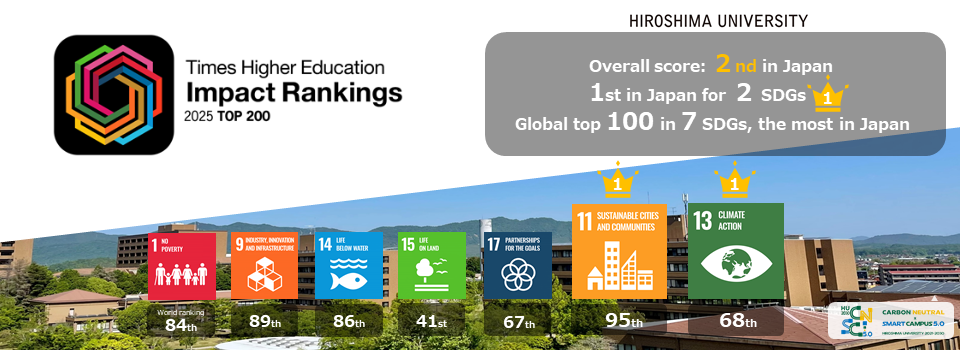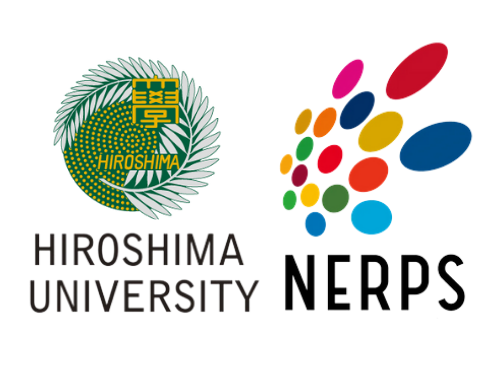Email: u-strategy*office.hiroshima-u.ac.jp (Please replace*with @)
Hiroshima University secured 2nd place among Japanese universities in THE's 2025 Impact Rankings and was ranked in the global top 100 in seven SDG categories, the most in Japan!
*The THE Impact Rankings are published annually by the UK-based higher education magazine Times Higher Education and assess how universities around the world contribute to the United Nations’ Sustainable Development Goals (SDGs).

Times Higher Education (THE) released its 2025 Impact Rankings on June 18, placing Hiroshima University (HU) in the global top 100 in seven SDG categories, more than any other university in Japan.
In the overall ranking, HU secured 101-200th place among 2,318 universities worldwide, tying with three other universities for second place in Japan. This consistent ranking reflects the university's ongoing efforts in education, research, and social contributions, which have created a synergistic effect between leading university reforms and university-wide efforts to achieve the SDGs.
The seven categories that ranked in the global top 100 and the two items that tied for first place in Japan are as follows:
| SDG category | World Ranking | Japan Ranking |
| SDG 15 (Life on Land) | 41st (out of 854 universities) | 2nd (out of 39 universities) |
| SDG 17 (Partnerships for the Goals) | 67th (out of 2,389 universities) | 2nd (out of 70 universities) |
| SDG 13 (Climate Action) | 68th (out of 1,089 universities) | 1st (out of 38 universities) |
| SDG 1 (No Poverty) | 84th (out of 1,267 universities) | 2nd (out of 29 universities) |
| SDG 14 (Life Below Water) | 86th (out of 711 universities) | 2nd (out of 34 universities) |
| SDG 9 (Industry, Innovation and Infrastructure) | 89th (out of 1,156 universities) | 7th (out of 51 universities) |
| SDG 11 (Sustainable Cities and Communities) | 95th (out of 1,154 universities) | 1st (out of 51 universities) |
| SDG 12 (Responsible Consumption and Production) | 101-200th (out of 973 universities) | Tied for 1st (out of 44 universities) |
| SDG 10 (Reduced Inequalities) | 201-300th (out of 1,261 universities) | Tied for 1st (out of 30 universities) |
One of the key factors behind HU’s second-place overall score in Japan was its high evaluation in SDG 15 (Life on Land). In 2024, the Higashi-Hiroshima Campus was certified by Japan’s Ministry of the Environment as a “Sustainably Managed Natural Site.” HU makes use of the campus’s rich natural environment in student education while working to preserve it for future generations. In doing so, the university not only contributes to the achievement of the 30by30 target—which aims to effectively conserve more than 30% of land and sea as healthy ecosystems by 2030—but also promotes sustainable initiatives that balance biodiversity conservation and climate change mitigation.
HU ranked within the global top 100 and achieved sole first place in Japan in two categories—SDG 11 (Sustainable Cities and Communities) and SDG 13 (Climate Action). This marks the second consecutive year that the university has secured the top position in Japan for both categories.
These results reflect HU’s continued efforts toward achieving carbon neutrality. In particular, SDG 11 was recognized for initiatives such as the development of Zero Energy Buildings (ZEBs)—buildings designed to achieve a net-zero balance of energy generation and consumption based on sustainable standards.
SDG 13 highlighted the university’s increased use of low-carbon energy. Looking ahead, HU plans to further advance these efforts by utilizing the solar power facility installed on the Higashi-Hiroshima Campus as part of a large-scale solar energy project.
HU submitted data for all 17 SDGs and is working to achieve the SDGs in a wide range of fields.
The university’s international efforts to achieve the SDGs have been recognized not only in the THE Impact Rankings but also in the THE Awards Asia. In the 2025 edition announced in April, HU received the grand prize in two categories: “International Strategy of the Year” and “Outstanding Contribution to Environmental Leadership.” This marked the first time a university in Japan has won awards in two categories at the same time.
Also read: Hiroshima University Wins Grand Prizes at THE Awards Asia 2025
By continuing its efforts to achieve the SDGs, HU aims to contribute to a peaceful and sustainable world by 2030 and beyond.
About THE Impact Rankings and THE Awards Asia
THE Impact Rankings: These rankings evaluate universities' social contributions using the United Nations' SDGs (Sustainable Development Goals) framework. Held for the seventh time this year, the rankings included 2,318 universities worldwide, the largest participation to date. The overall ranking is calculated by combining the score in SDG 17 (Partnerships for the Goals) with the top three scores out of the remaining 16 SDGs.
THE Awards Asia: These awards recognize outstanding reform efforts by Asian universities. Initiated in 2019, the 2025 awards mark the seventh edition.

NERPS serves as an information hub for SDGs promotion and participation of students, researchers, companies, public offices and citizens in peace and sustainability.
Hiroshima University Office of University Strategy

 Home
Home














